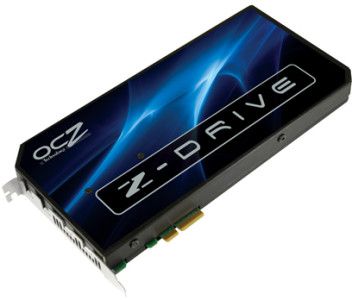- Qualcomm Launches Snapdragon 4 Gen 2 Mobile Platform
- AMD Launches Ryzen PRO 7000 Series Mobile & Desktop Platform
- Intel Launches Sleek Single-Slot Arc Pro A60 Workstation Graphics Card
- NVIDIA Announces Latest Ada Lovelace Additions: GeForce RTX 4060 Ti & RTX 4060
- Maxon Redshift With AMD Radeon GPU Rendering Support Now Available
OCZ Launches PCI-E-based SSD, “Z-Drive”
In the past few months, whenever the term “PCI-E SSD” was mentioned, the company ‘Fusion-io’ usually came to mind first. They were the innovators where the technology was concerned, but it was only a matter of time before others followed suit, and so far, those companies have included OCZ and Super Talent, the latter of which we talked about a few weeks ago.
Both OCZ’s and Super Talent’s drives have their perks, but OCZ’s Z-Drive easily wins any aesthetics awards (as you can see, it looks far better now than it did at CeBit). Compared to the Super Talent drive though, the Z-Drive falls a bit behind in performance. The 1TB model boasts Read speeds of 500MB/s and Write speeds of 470MB/s. This is compared to Super Talent’s RAIDDrive’s 1.2GB/s Read and 1.3GB/s Write.
We can assume that the pricing difference for both company’s models is quite stark, and OCZ is catering more towards enthusiasts, whereas Super Talent is going after the professionals or server environment. One thing to note also is that not many PCI-E-based SSDs can currently act as boot devices, so if you’re interested in one of these, you’re best bet is to have a standard S-ATA SSD as your OS drive, and use this as a supplement. Just the thought of that is amazing…

OCZ will compete against the RAIDDrive with its own Z-Drive SSD using a PCI-E 2.0 x4 slot. It will feature a combined 256MB cache managed with an onboard RAID controller. Capacities of 250GB, 500GB, and 1TB will be offered. Maximum read and write speeds vary for each model in the series, although the maximum sustained write speed will be limited to 200 MB/s for all Z-Drives. Random read and write speeds were not made available.
| Source: DailyTech |
Discuss: Comment Thread
|




